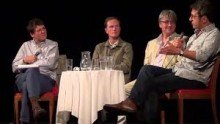This is a lecture and Q&A session that Dorset Eye filmed in Bridport for THE 45TH LECTURE ON EVERYTHING in 2013.
‘A few years ago, George Monbiot was persona non grata in seven countries and had a life sentence in absentia in Indonesia. He is now a bestselling author, columnist for the Guardian and Visiting Professor at the School of the Built Environment at Oxford Brookes University. In 1995 Nelson Mandela presented him with a United Nations Global 500 Award for outstanding environmental achievement. His books include Captive State: the Corporate Takeover of Britain, The Age of Consent: A Manifesto for a New World Order and Heat: How We Can Stop the Planet Burning. He has held visiting fellowships or professorships at the universities of Oxford (environmental policy), Bristol (philosophy), Keele (politics) and East London (environmental science). www.monbiot.com is one of the world’s highest-ranked comment sites. An entire chapter of his new book, Feral, is devoted to the subject of marine reserves.
Dr Philip Hoare was born, grew up and still lives in Southampton. He is the author of seven works of non-fiction, including biographies of Stephen Tennant and Noel Coward, Wilde’s Last Stand, Spike Island: The Memory of a Military Hospital, England’s Lost Eden: Adventures in a Victorian Utopia, and Leviathan Or, The Whale, which won the BBC Samuel Johnson Prize, 2009. His new book, The Sea Inside, was ‘Book of the Week’ in the Guardian, The Times, and the Mail on Sunday. He is Senior Lecturer in Creative Writing at the University of Southampton. His work for the BBC includes Travels with Pevsner: Hampshire and the Isle of Wight, Arena: The Hunt for Moby-Dick, and Philip Hoare’s Guide to Whales. He is also co-curator of the Moby-Dick Big Read – www.mobydickbigread.com
Callum Roberts is the author of The Unnatural History of the Sea, a Washington Post Book of the Year and winner of the Rachel Carson Environment Book Award. A professor of marine conservation at the University of York, he has appeared in several documentaries, including America Before Columbus and The End of the Line, and is a board member of Seaweb, a U.S.-based environmental group. In his most recent book, Ocean of Life (2012), we get a panoramic tour beneath the sea. Roberts reveals the richness of marine life, and how it has altered over the centuries. Not only does he show how we are fishing our oceans to extinction, but crucially he also explains how this directly affects our lives on land. Ocean of Lifeshould galvanise debate worldwide. Roberts shows how we can arrest and reverse the damage we are doing.
Our three visitors are interviewed by the writer Horatio Morpurgo who was part of the successful campaign to close sixty square miles of Lyme Bay to the scallop-dredgers in 2008. He is a regular contributor to the New Internationalist and writes for many magazines and websites, mainly on the environment, literary themes and European affairs. In his Drake’s Graffiti: Coming Home Slowly to What the Sea Means (2010, updated 2013) he situates Marine Protected Areas in the long, complex relationship between the West Country and the sea. Lady Chatterley’s Defendant & Other Awkward Customers (Just Press, 2011) was his first essay collection. See www.horatiomorpurgo.com for details.
Q&A Session
The Lyme Bay ‘Marine Protected Area’, created in 2008, was the first such area of significant size in English waters. Enormously popular, it was greeted at the time as a turning-point in our collective relationship with the sea. Five years on we invited three of this country’s best writers about the sea to a discussion in Bridport’s Electric Palace about how that relationship is going. The present government, bowing to pressure from fishing industry lobbyists, is withdrawing support from much of what was then envisaged. Of the 127 reserves proposed by the Wildlife Trusts, it selected just 31. In Lyme Bay the Blue Marine Foundation is seeking to work in a new way with responsible fishermen – one of its trustees, Prof. Callum Roberts, explains its role during the interview.’







